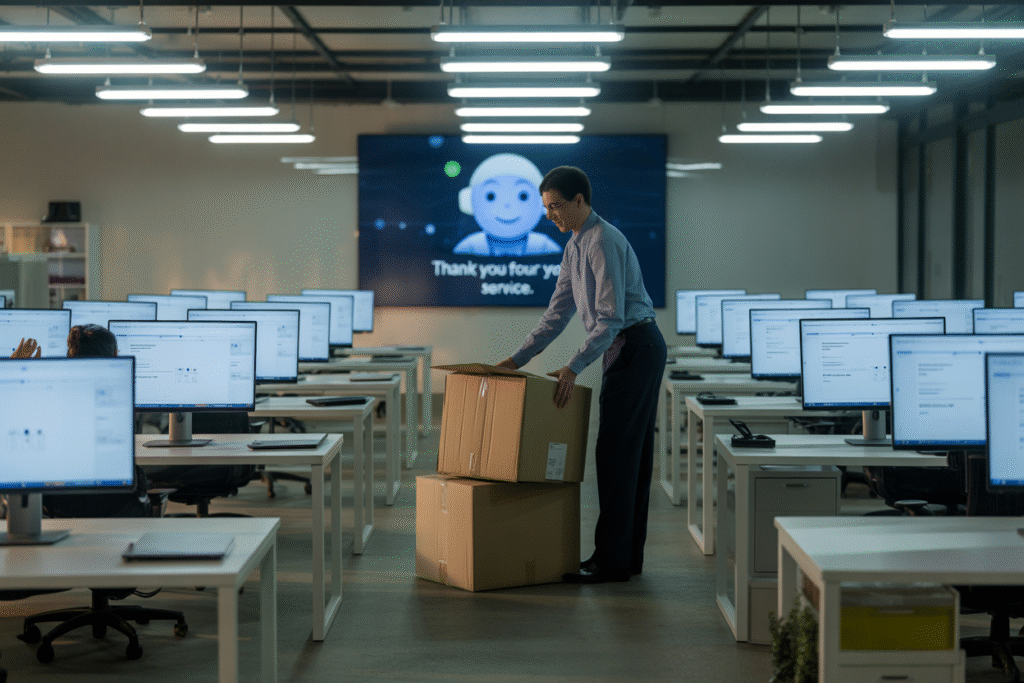Thousands of Microsoft employees just lost their jobs—because AI can now do their work faster, cheaper, and without coffee breaks.
While tech CEOs promise that AI will “augment, not replace,” the pink slips at Microsoft tell a different story. In the last 72 hours, leaked memos and viral posts have revealed the human cost of the AI boom. If you’ve been wondering whether your own role is safe, the answer might be hiding in plain sight.
The Layoff Memo Nobody Was Supposed to See
A single screenshot lit the fuse. An internal Microsoft Slack channel showed a manager bluntly stating that “AI now writes 30% of our code base,” followed by a list of affected teams. Within minutes, the image was everywhere—Reddit, X, LinkedIn—racking up millions of views and thousands of angry comments. Employees described the moment as “surreal.” One engineer told me, “I refreshed the page and my entire sprint backlog was marked ‘completed by Copilot.’” The speed of the leak mirrored the speed of the firings themselves: some workers received termination emails before their managers even scheduled a meeting. The memo’s language was clinical, almost robotic, which only fueled the outrage. People wanted human empathy, not HR boilerplate.
From Assistants to Authors: How AI Ate the Codebase
Microsoft insists that GitHub Copilot is a “pair programmer,” but insiders paint a different picture. Over the past six months, Copilot’s suggestions have grown from autocomplete snippets to entire function bodies. Junior developers—once tasked with boilerplate code—found themselves clicking “accept all” instead of writing. Managers noticed pull requests arriving faster, bug counts dropping, and velocity metrics soaring. The unintended consequence? Those junior roles became redundant. A senior dev explained, “If Copilot writes 80% of the scaffolding, you only need seniors to review and refactor.” The math is brutal: fewer humans, more machines. And it’s not just code. AI now drafts internal documentation, release notes, and even customer emails. The company’s AI job displacement isn’t a future risk—it’s a present reality wearing a friendly chatbot mask.
The Ethics Debate Nobody Asked For
When layoffs hit, the internet split into two camps. Camp One argues that progress always displaces workers; after all, we no longer employ lamplighters or switchboard operators. Camp Two counters that AI job displacement is different because it’s happening at lightning speed and at scale. Ethicists point to consent: were employees informed that training their AI replacements would cost them their livelihoods? Labor unions demand retraining programs, while executives cite shareholder obligations. The debate gets messier when you consider the global talent pool. A developer in Seattle loses her job, but a cheaper contractor in another country—now supercharged by AI—fills the gap. The ethical question isn’t just “Is this fair?” but “Who gets left behind when the algorithm decides?”
Silicon Valley’s Double Speak
Listen to any tech keynote and you’ll hear the same buzzwords: augmentation, empowerment, human-AI collaboration. Yet behind closed doors, the metrics tell a different story. One leaked slide deck showed a 40% reduction in engineering headcount projected for FY26, paired with a cheerful note: “AI-driven efficiency gains.” The contradiction is jarring. Publicly, CEOs praise human creativity; privately, spreadsheets celebrate cost savings. Venture capitalists fuel the fire by rewarding startups that replace humans fastest. A founder recently bragged on X, “We onboarded 1,000 AI agents last week—no payroll taxes!” The hype cycle spins so quickly that yesterday’s “copilot” becomes today’s captain, and tomorrow’s executioner. If words like collaboration still mean anything, they need to survive contact with quarterly earnings calls.
What Happens to the Rest of Us?
If Microsoft—once the gold standard of stable tech employment—can ax thousands overnight, no role feels safe. Designers watch AI generate mockups in seconds. Marketers see copy written, A/B tested, and optimized by algorithms. Even recruiters use AI to screen résumés—including résumés of the people who built the screening tools. So what can you do? First, audit your daily tasks. Anything repetitive, template-driven, or easily measured is a target. Second, double down on uniquely human skills: negotiation, empathy, creative leaps that machines can’t mimic. Third, push for transparency. Ask your company how AI is being trained and whether your data is feeding the very model that might replace you. The future isn’t pre-written; it’s negotiated one uncomfortable conversation at a time. If you’re waiting for a sign to future-proof your career, the pink slips at Microsoft just handed it to you.


